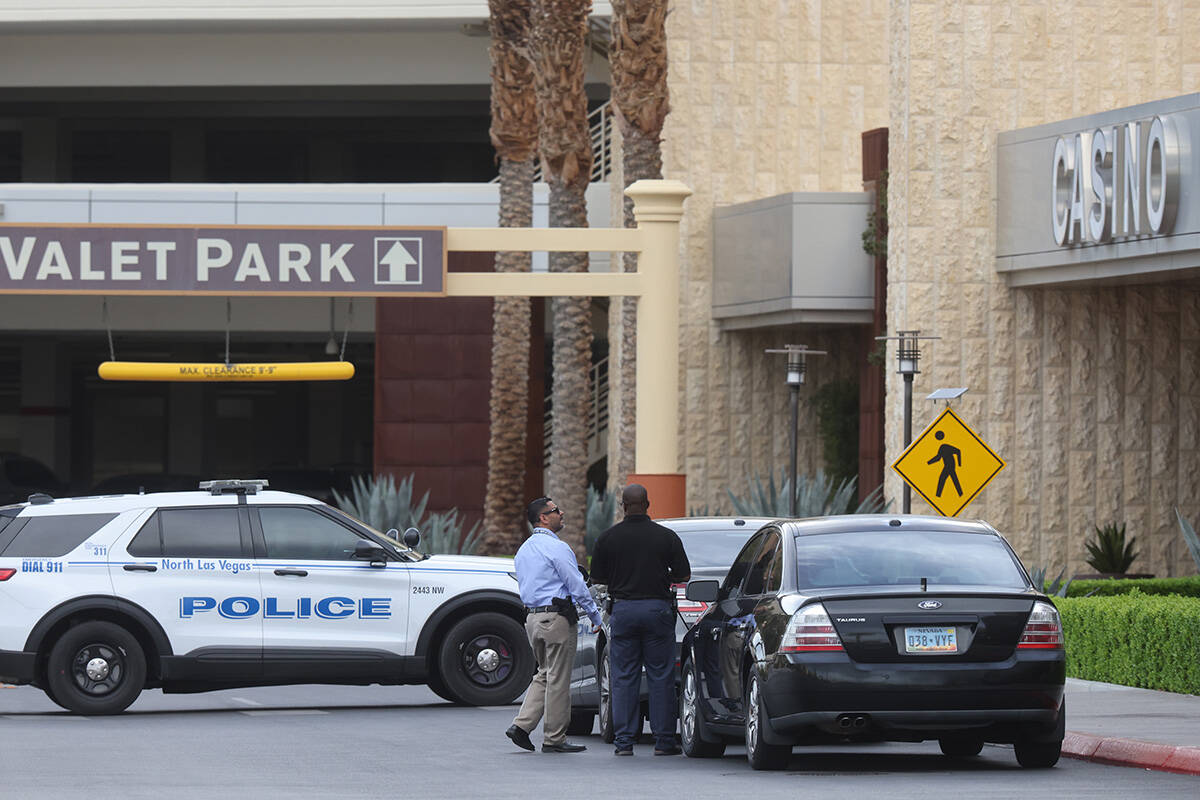Do gaming regulators investigate when violent crime occurs in casinos?
When North Las Vegas resident Na’Onche Osborne was shot and killed at the Aliante casino last month, the investigation was led by the North Las Vegas Police Department, not the Nevada Gaming Control Board’s Enforcement Division.
Even though the Control Board has a force of 93 sworn Category II peace officers certified by the state that can investigate and make arrests for criminal activity, it instead focuses on gaming-centered crime.
Aerion Warmsley, 19, is accused of fatally shooting Osborne, son of former state senator and one-time North Las Vegas mayoral candidate Pat Spearman inside the casino. Warmsley also is alleged to have participated in a crime spree before and after the shooting, fleeing from police, and carjacking and injuring multiple people. He was arrested March 27 near Boulder Highway and Sahara Avenue, where the pursuit ended hours after the shooting, and booked on suspicion of open murder.
It ended up involving multiple police jurisdictions, but a suspect was quickly apprehended. Officials say one of the reasons it was resolved quickly is that police agencies and gaming enforcement officers “stay in their lanes” whenever a crime occurs involving a casino.
Gaming-related crimes
“Other than gaming-related crimes, local law enforcement agencies handle criminal investigations,” Gaming Control Board Chairman Kirk Hendrick said in an interview.
“NGCB enforcement agents routinely offer to assist local law enforcement agencies whenever serious criminal activities occur at licensed gaming establishments,” he said.
A representative of the North Las Vegas Police Department said Thursday that there’s a clear line between jurisdictions when a crime occurs within a casino.
“The recent incident at Aliante falls squarely within our scope due to the nature of the crime,” said Roberto Vaquera in an email. “When a shooting or other serious act of violence occurs, it’s automatically something our detectives respond to and investigate, regardless of the location — even if it’s inside a casino.
“There’s rarely confusion or overlap, as each agency knows its role and mission. We work in a cooperative manner when our paths do cross, and that collaboration helps ensure thorough investigations without jurisdictional friction,” he said.
Police agencies also have the authority to close off portions of a casino deemed a crime scene, just as they can close intersections or sections of highways when there’s a fatal car accident.
Enforcement Division
Kristi Torgerson, chief of the Control Board’s Enforcement Division, said her agency routinely investigates fraudulent acts, usually involving live games and thefts from a property or from a table.
The Control Board’s website says the Enforcement Division maintains five offices statewide and operates 24 hours a day, seven days a week. Primary responsibilities are to conduct criminal and regulatory investigations, arbitrate disputes between patrons and licensees, gather intelligence on organized criminal groups involved in gaming-related activities, make recommendations on potential candidates for the state’s List of Excluded Persons, conduct background investigations on work card applicants, and inspect and approve new games, surveillance systems, chips and tokens, charitable lotteries and bingo.
In their capacity of recommending nominations to the so-called “Black Book,” enforcement investigators look into cheating at gaming, including players and casino employees attempting to cheat casinos, as well as investigating licensees that allow minors to gamble.
The Control Board’s Enforcement Division isn’t the only team of investigators for regulators.
Investigations Division
Another group is the Control Board’s Investigations Division, under newly named Chief Luke Rippee who took over retired Carl Hoffman last month.
Investigations Division officers travel the world to prepare reports on companies and individuals seeking licensure in Nevada.
The Control Board’s website says the Investigations Division investigates all gaming license and key employee applicants to determine their viability, business integrity and suitability for licensure or approval. Division investigators produce detailed reports which are used by the Control Board and Nevada Gaming Commission as the basis for licensing recommendations or decisions.
Those investigators have expertise in corporate securities because they analyze activities of registered, publicly traded corporations and their subsidiaries involved in the Nevada gaming industry. Actions that might affect the industry, such as changes in control, public offerings, involvement in foreign gaming, and recapitalization plans are scrutinized by the division and reported to the Board. Division investigators produce detailed reports which are used by the Board and the Commission as the basis for licensing approvals.
Those types of investigations often take months to complete. Hendrick and Gaming Commission Chair Jennifer Togliatti frequently ask licensing applicants about their experiences with investigators compared with regulatory oversight in other states.
In almost every interaction, the word “thorough” comes up in response.
Contact Richard N. Velotta at rvelotta@reviewjournal.com or 702-477-3893. Follow @RickVelotta on X.
Additional incarceration
The Nevada Legislature is considering a bill that could double the jail or prison time a convicted criminal would face if the crime occurs within a hotel-casino.
Senate Bill 371, introduced by Sen. John Steinbeck, R-Las Vegas, on March 17, provides that a person who commits a crime on the property of a resort hotel shall, in addition to the term of imprisonment prescribed by statute for the crime, be punished by a term that is equal to the term of imprisonment prescribed by statute for the crime, according to the Legislative Counsel Bureau.
In the bill draft that has been referred to the Senate Judiciary Committee, jail time would be increased for misdemeanors and prison time upped for felonies.
Under the bill, the court would base the additional punishment on the facts and circumstances of the crime, the criminal history of the person, the impact of the crime on any victim, any mitigating factors presented by the person and any other relevant information.
The court must state on the record that it is considering additional penalties, and any added incarceration must run consecutively with the sentence prescribed by statute for the crime.




















